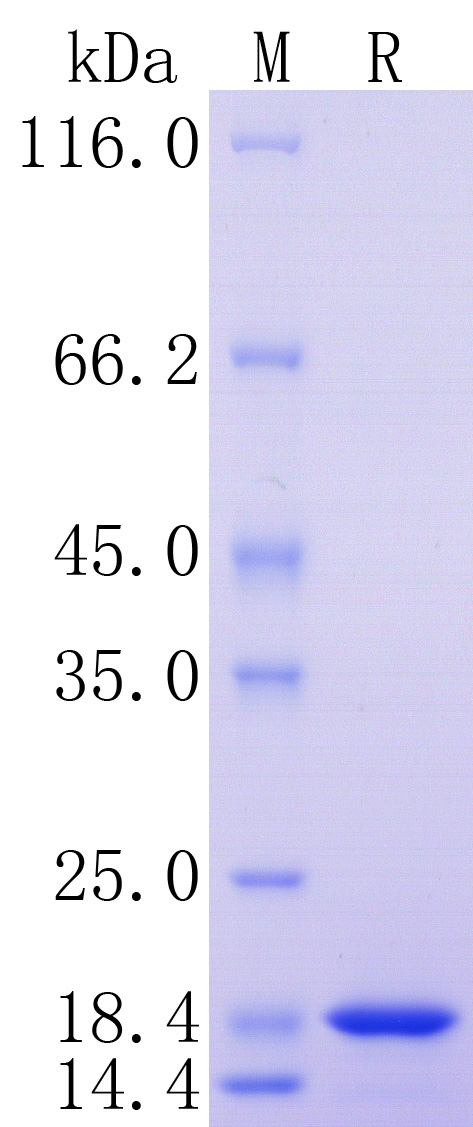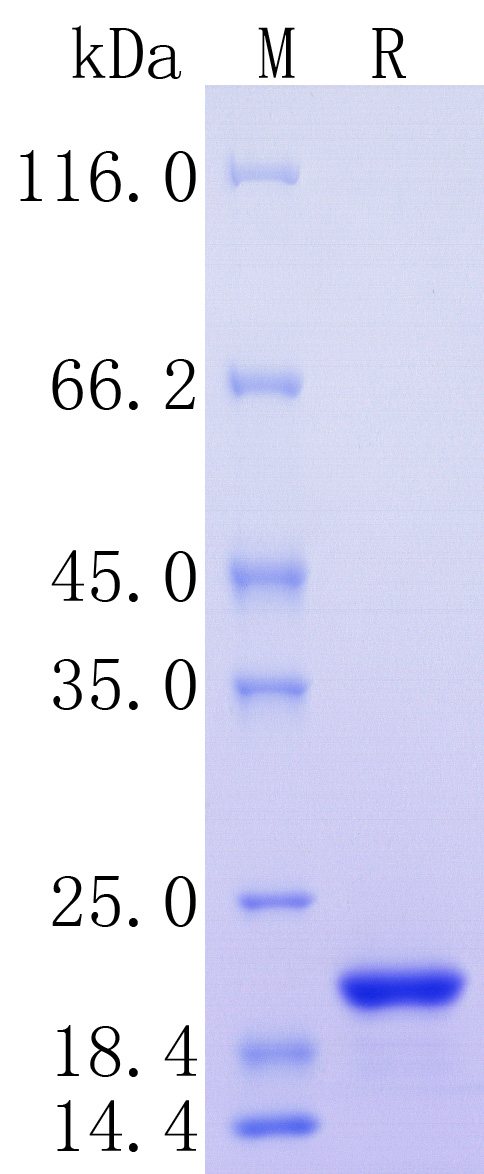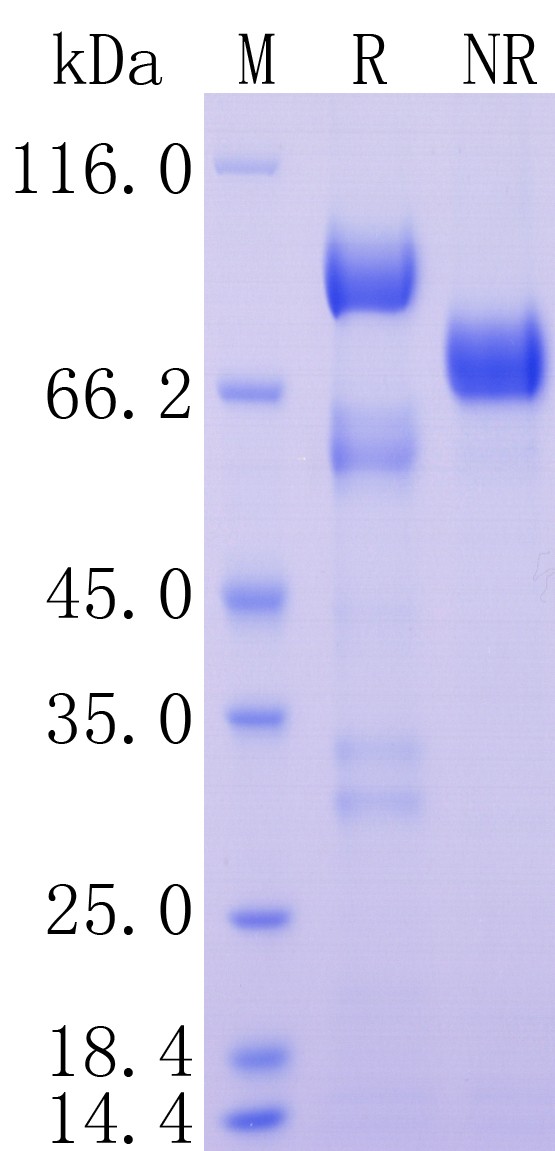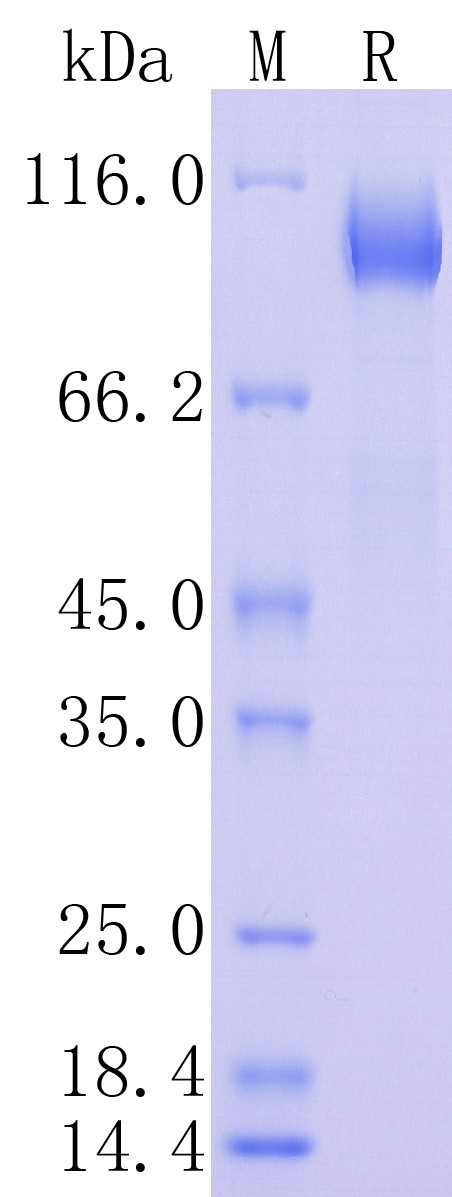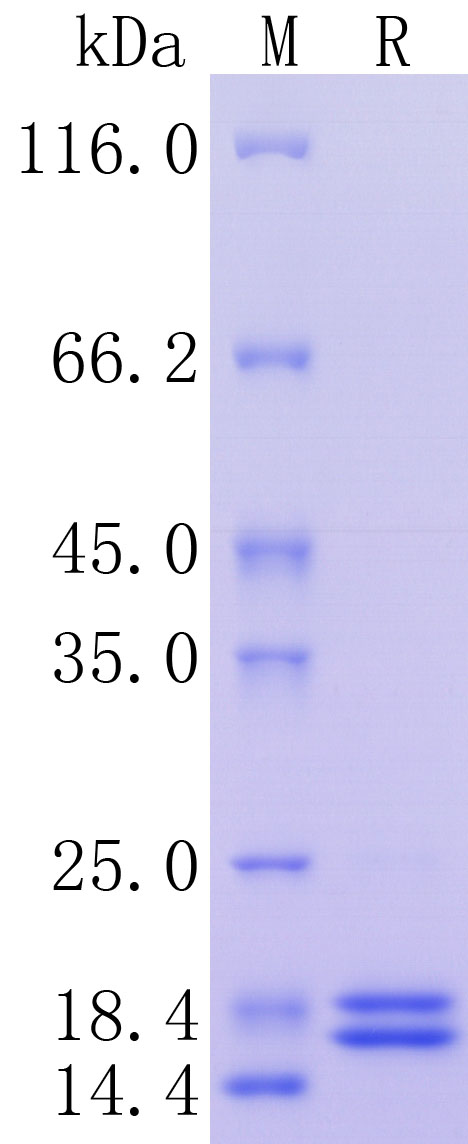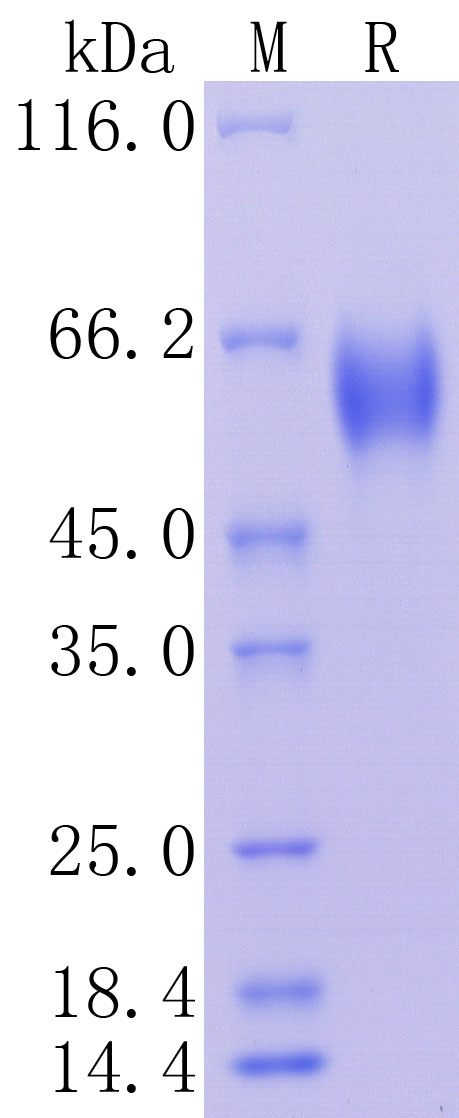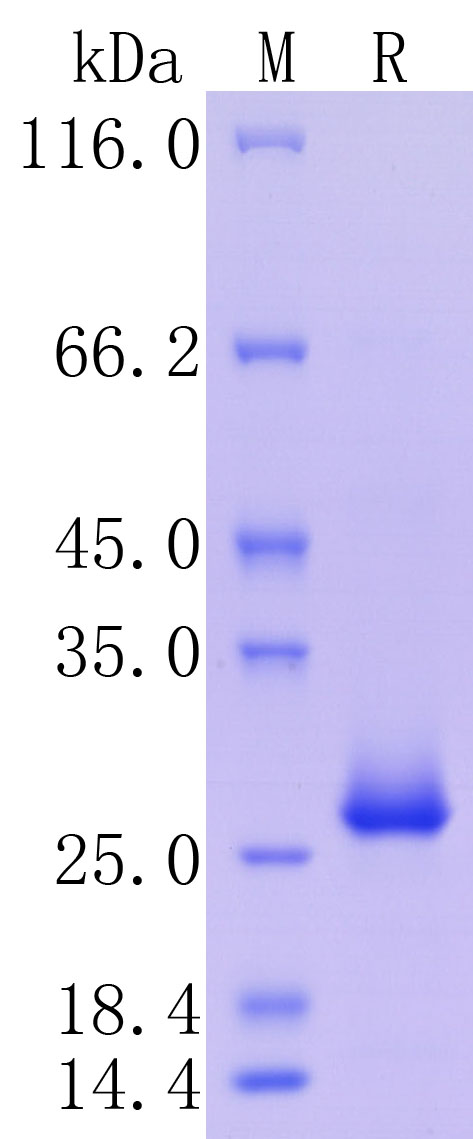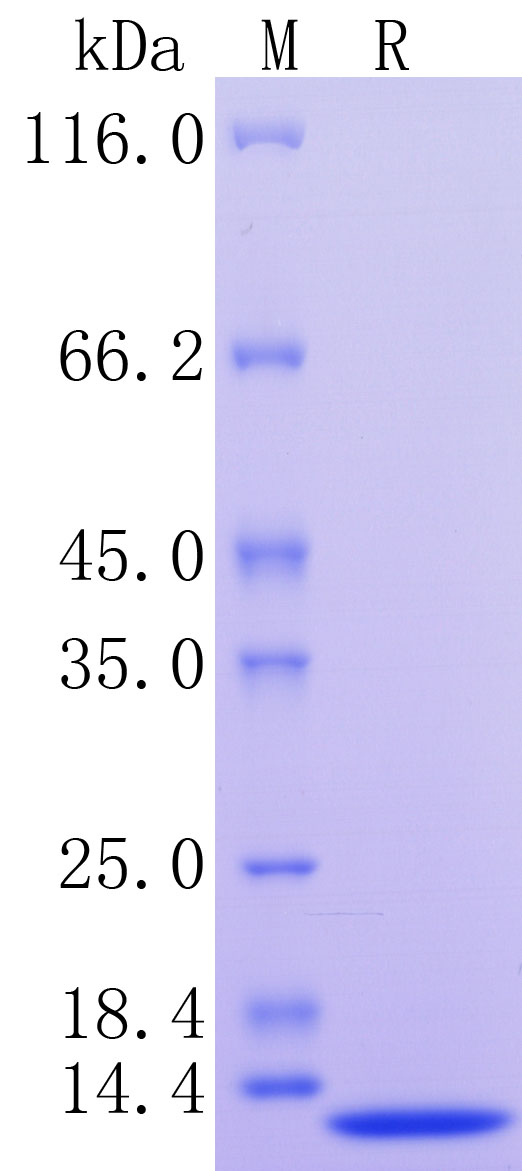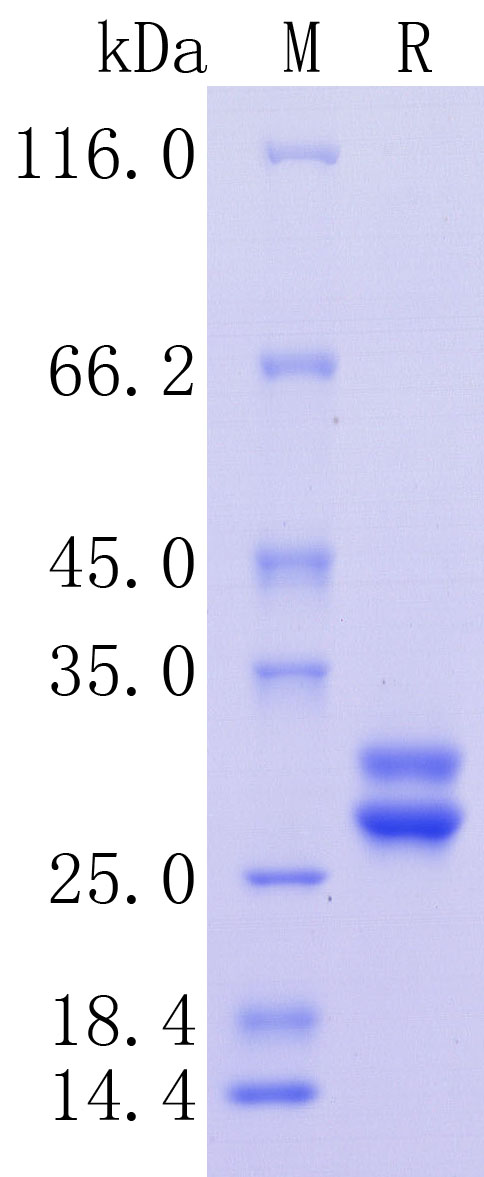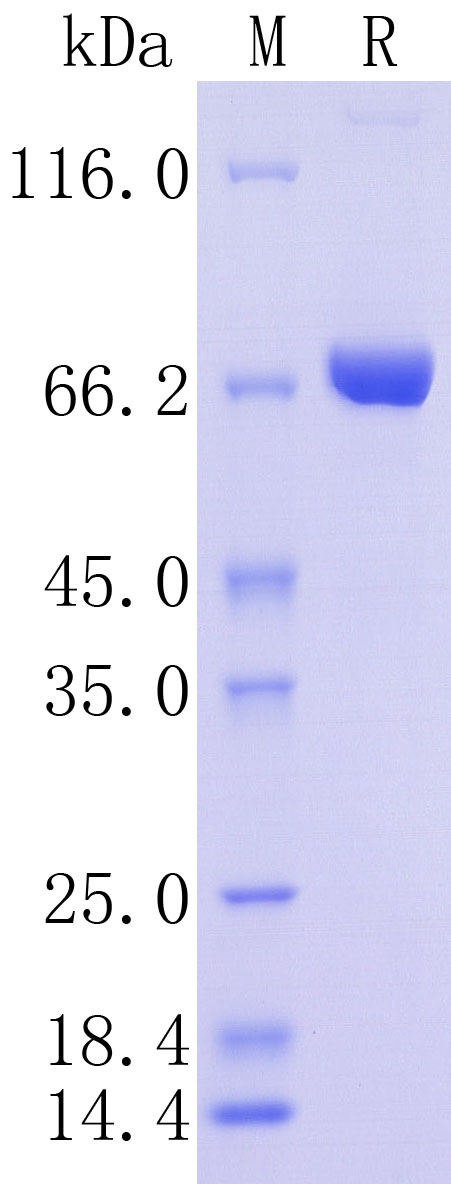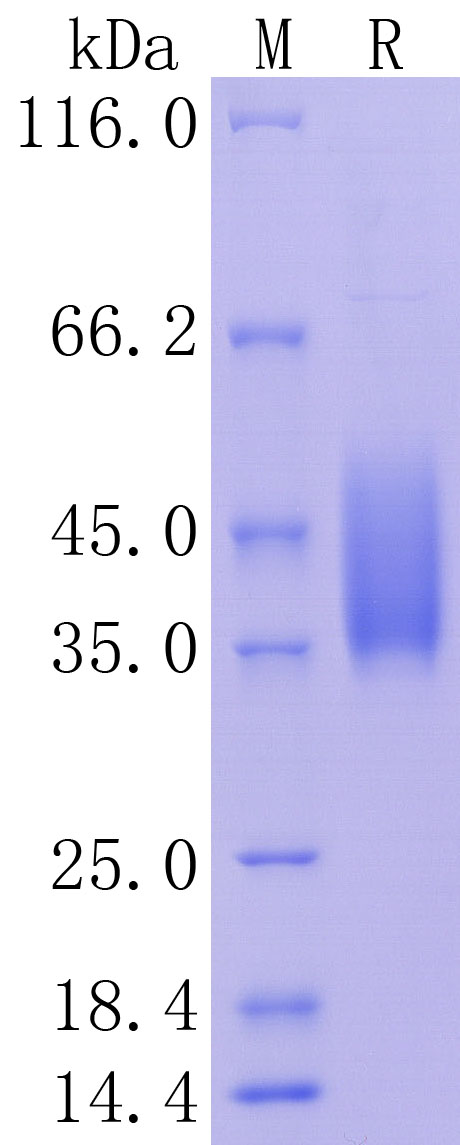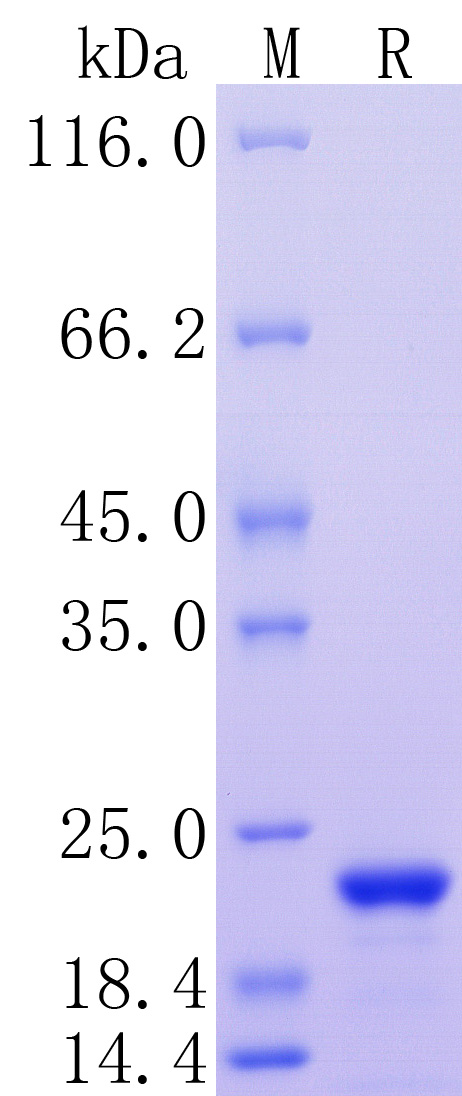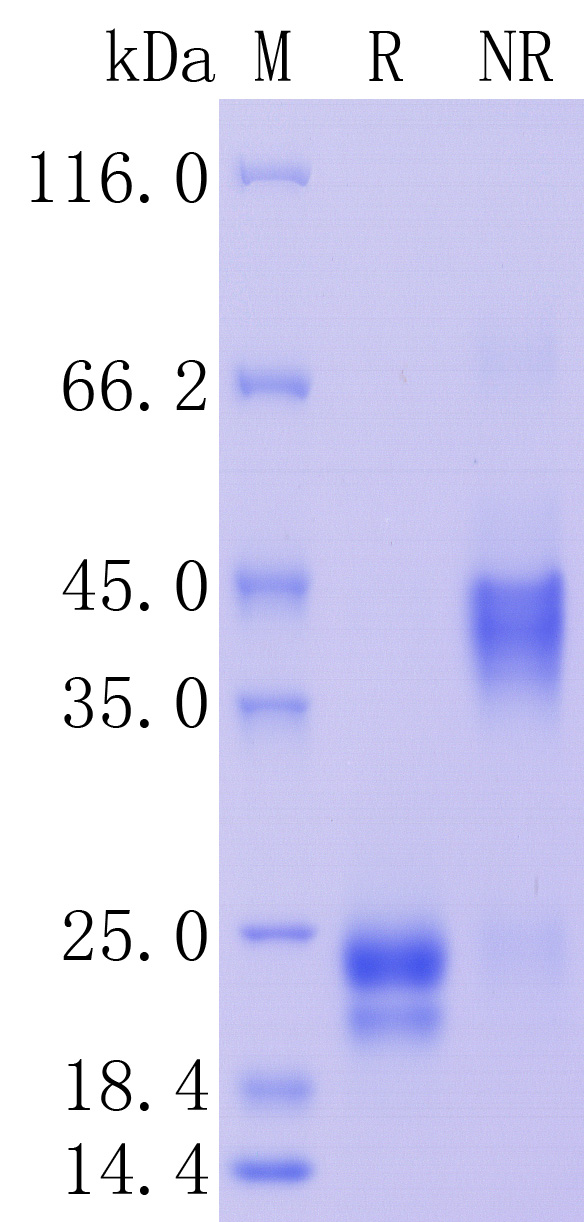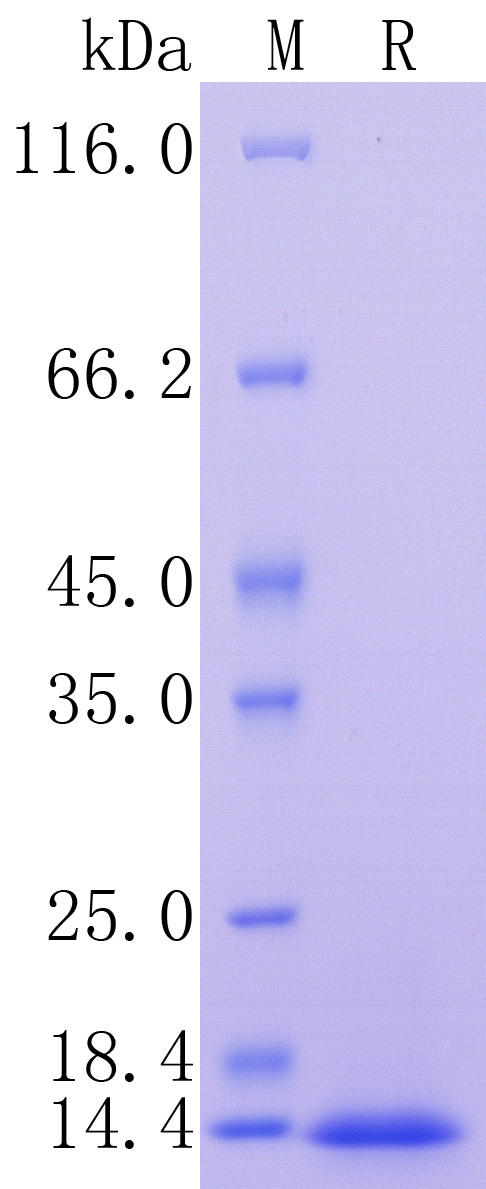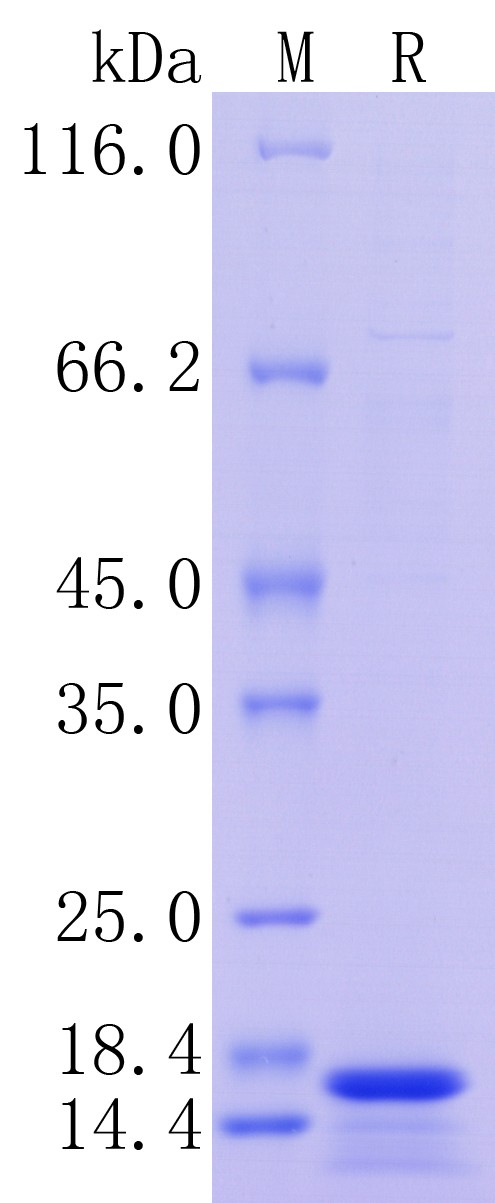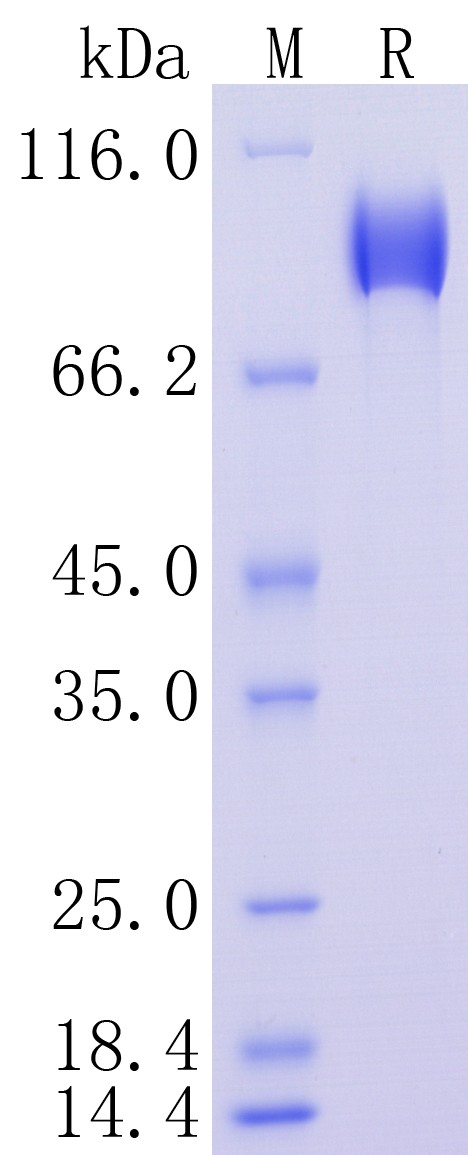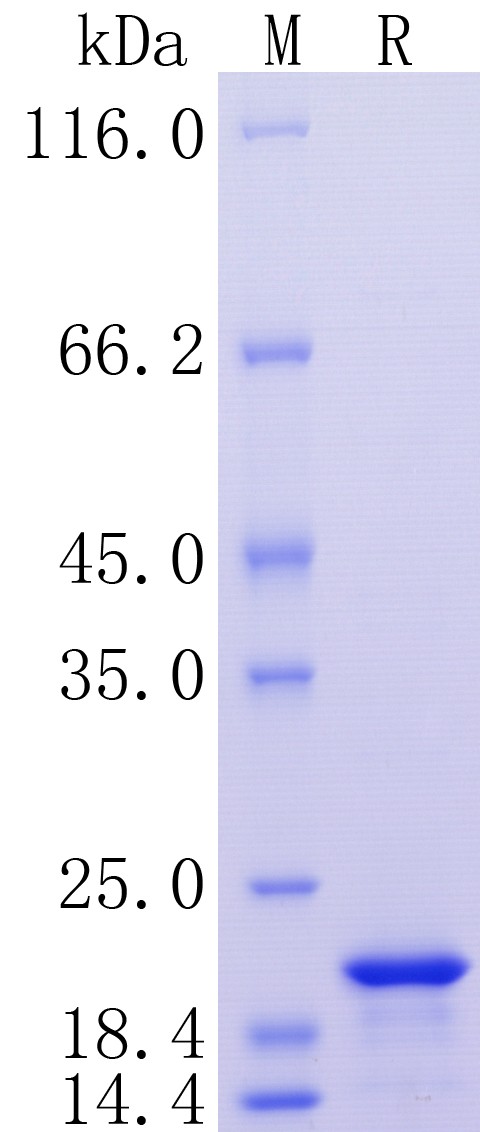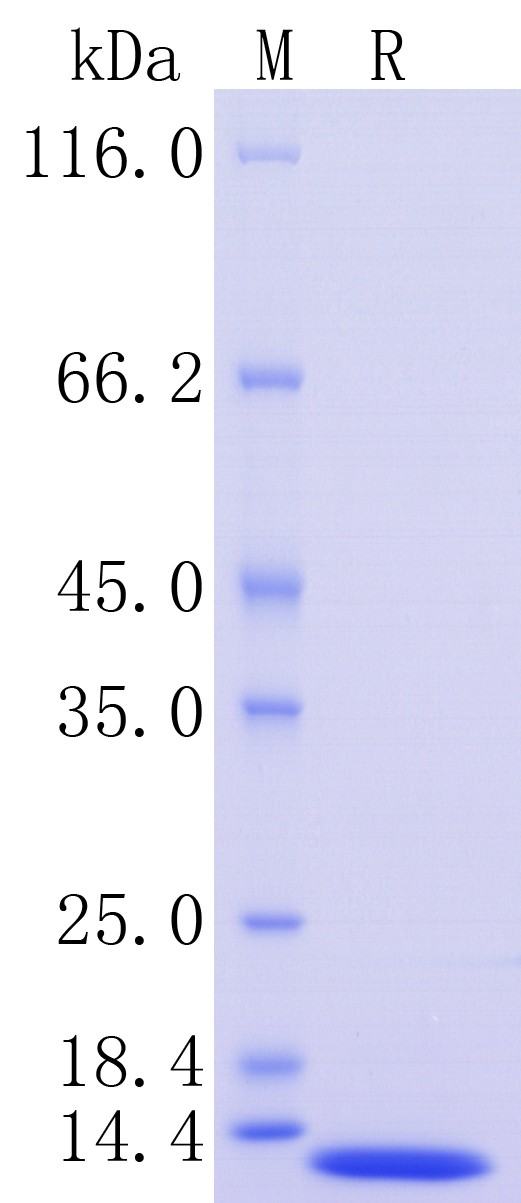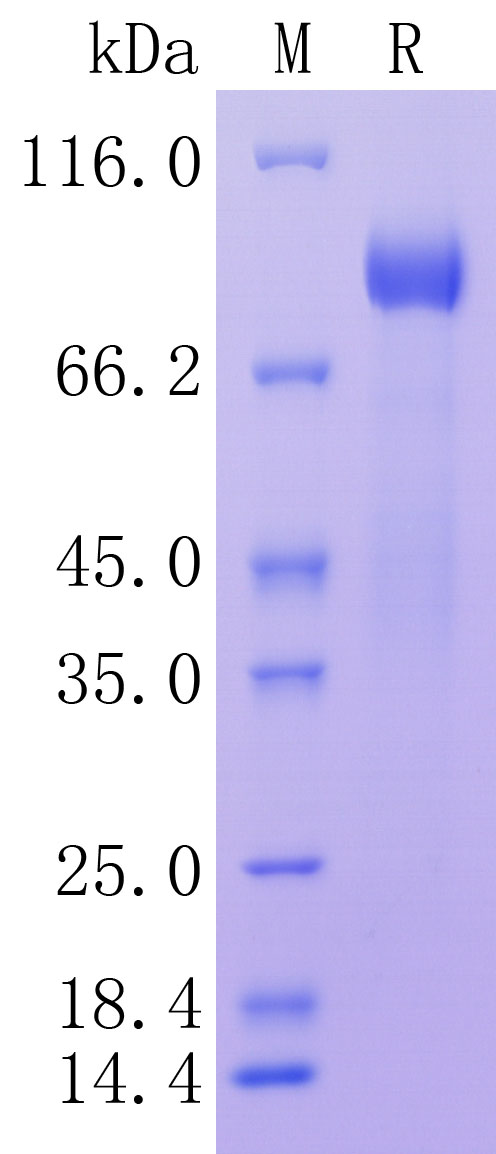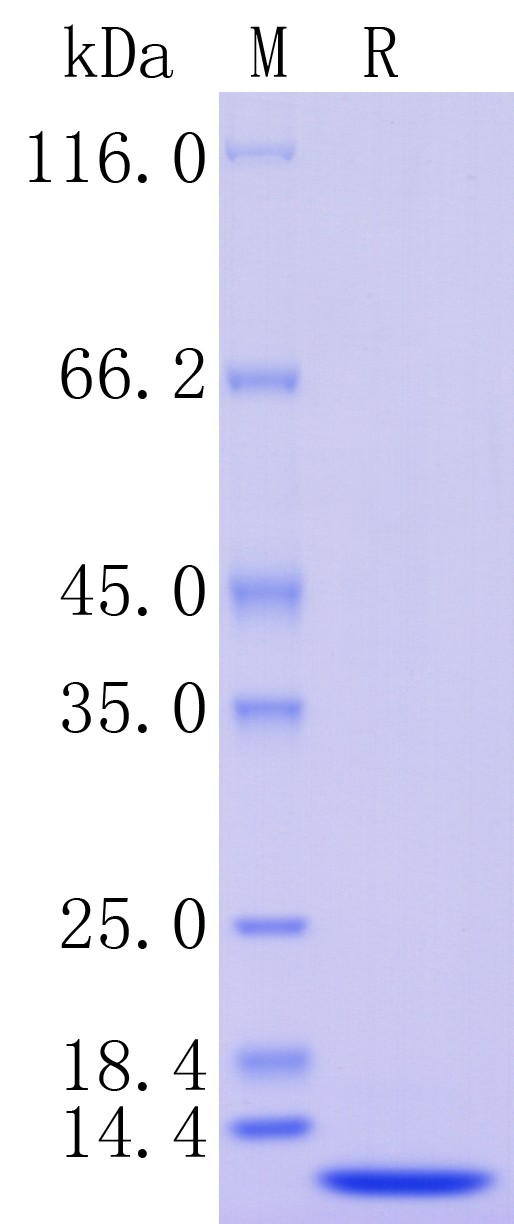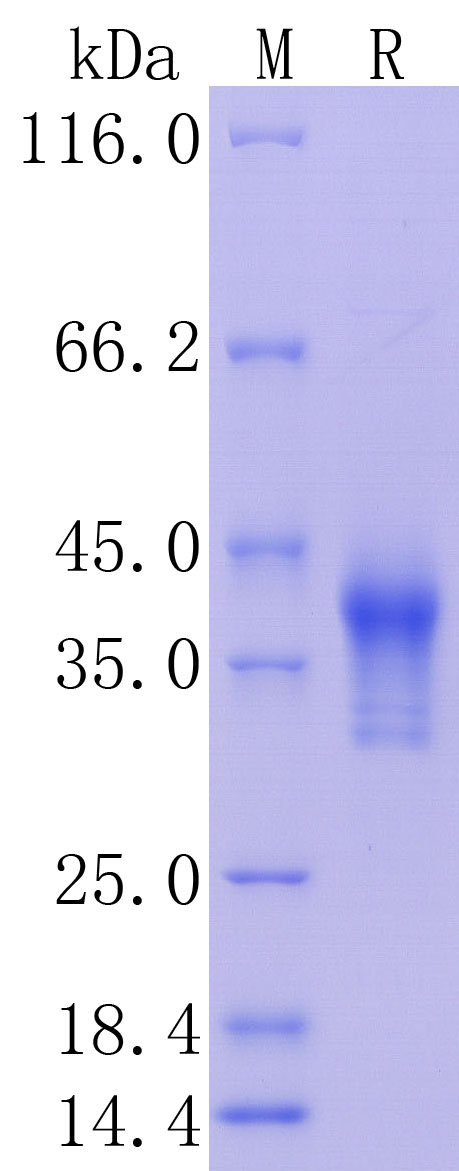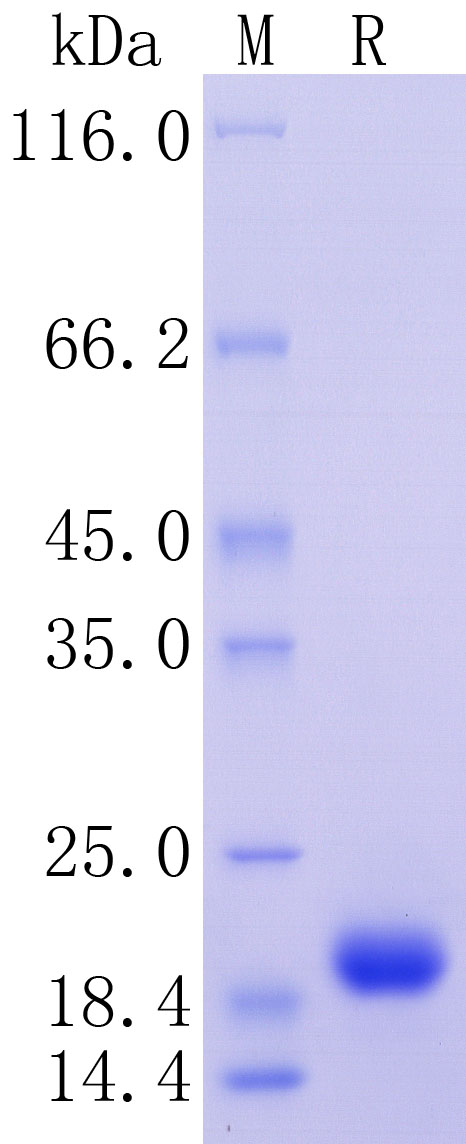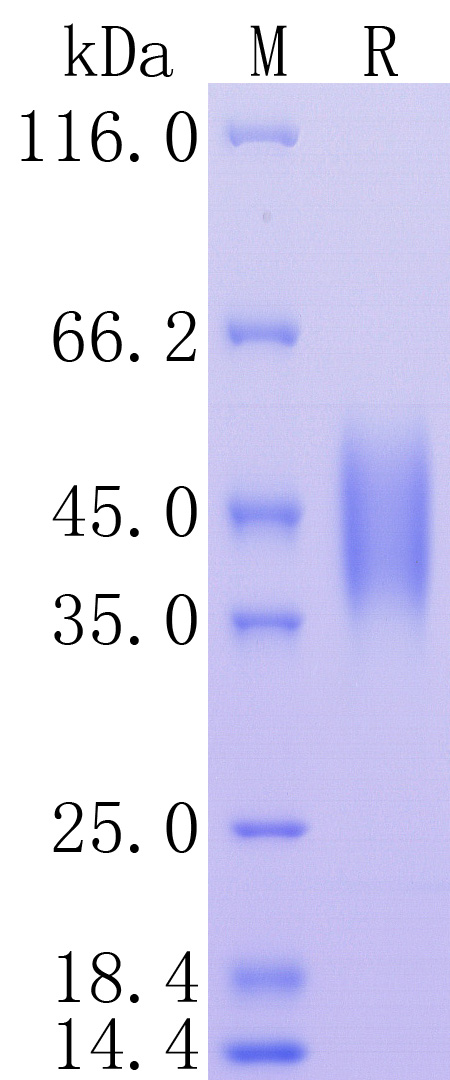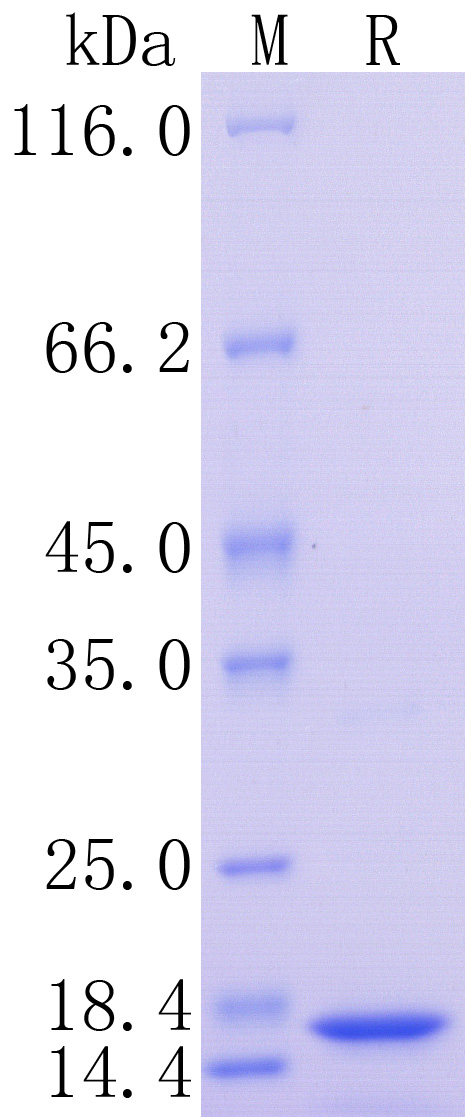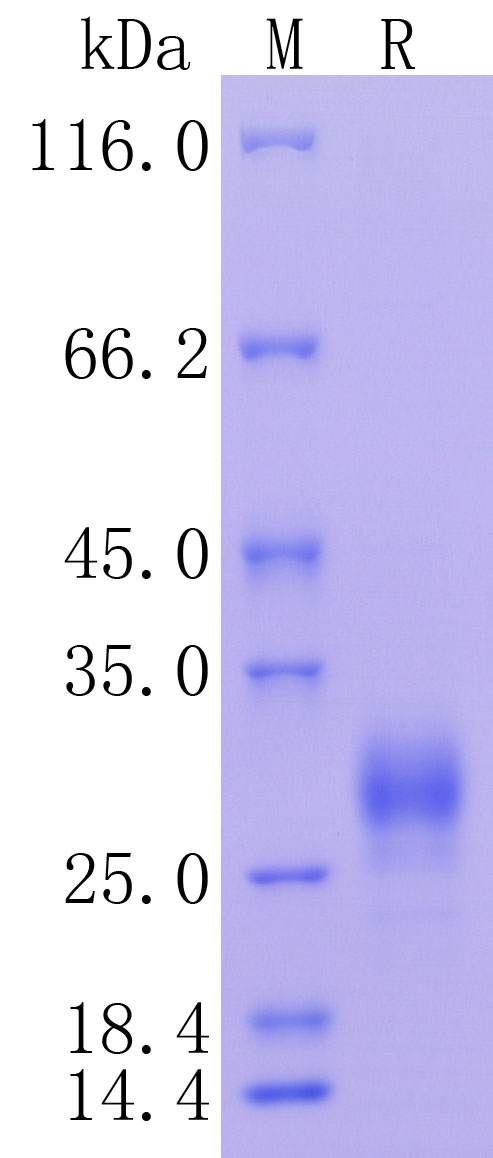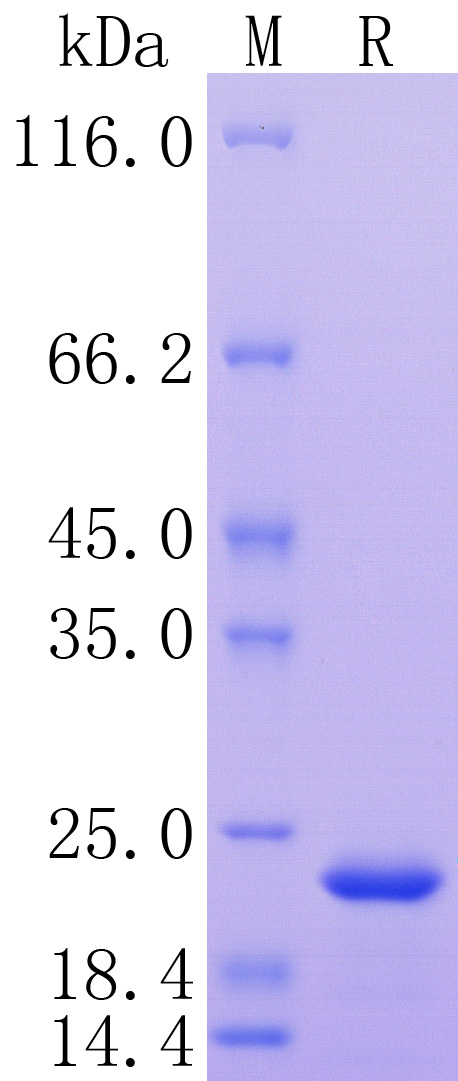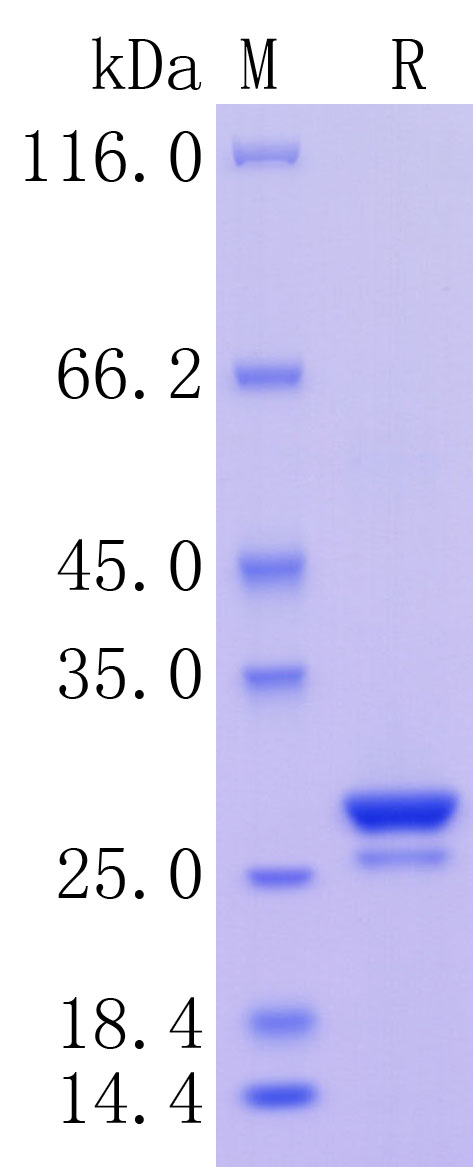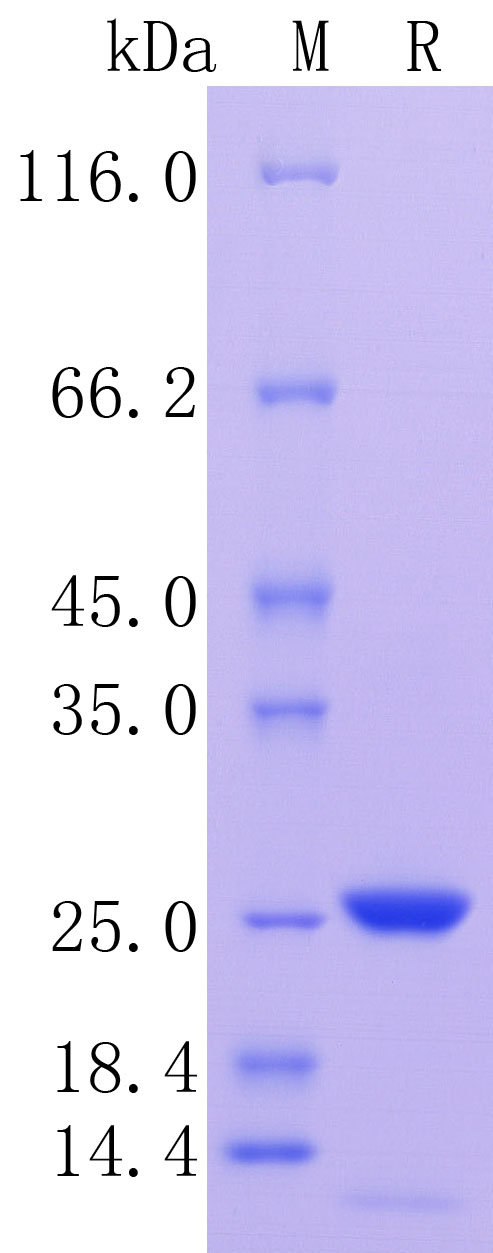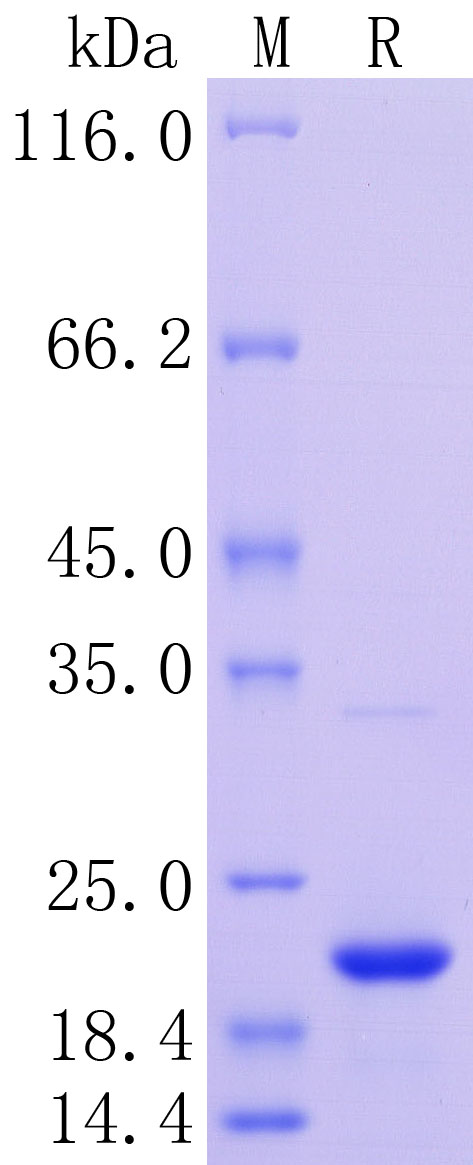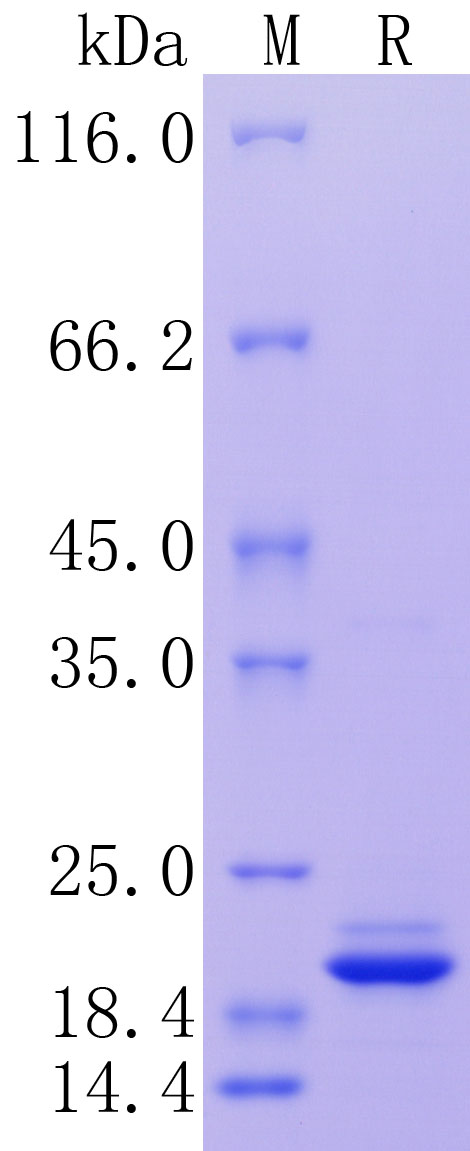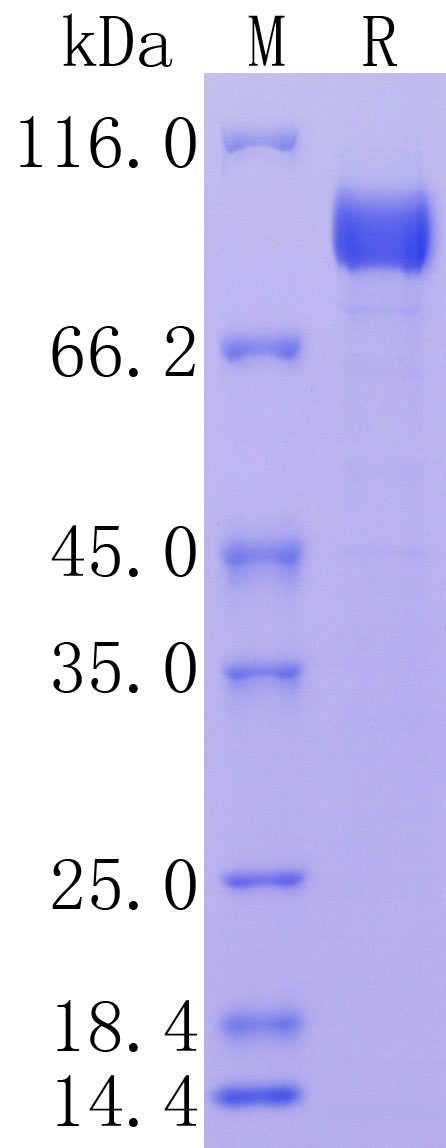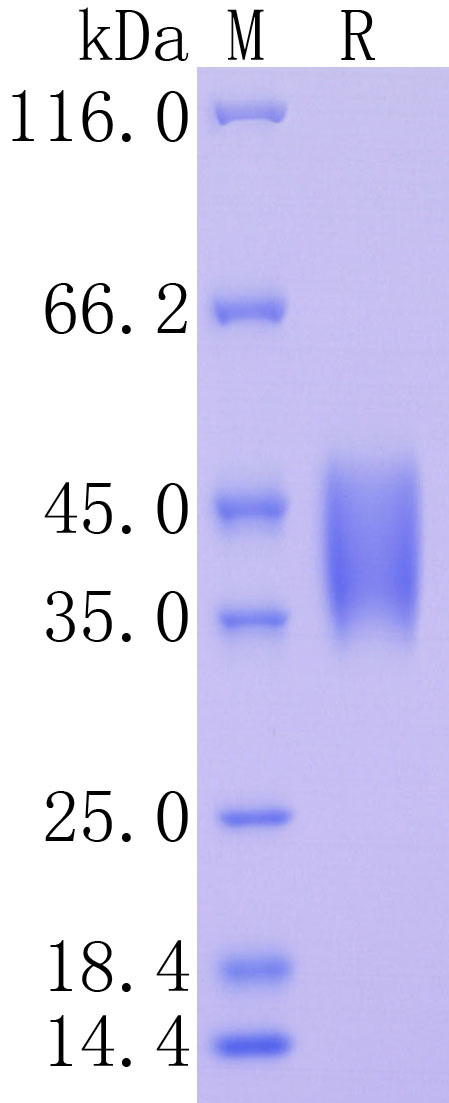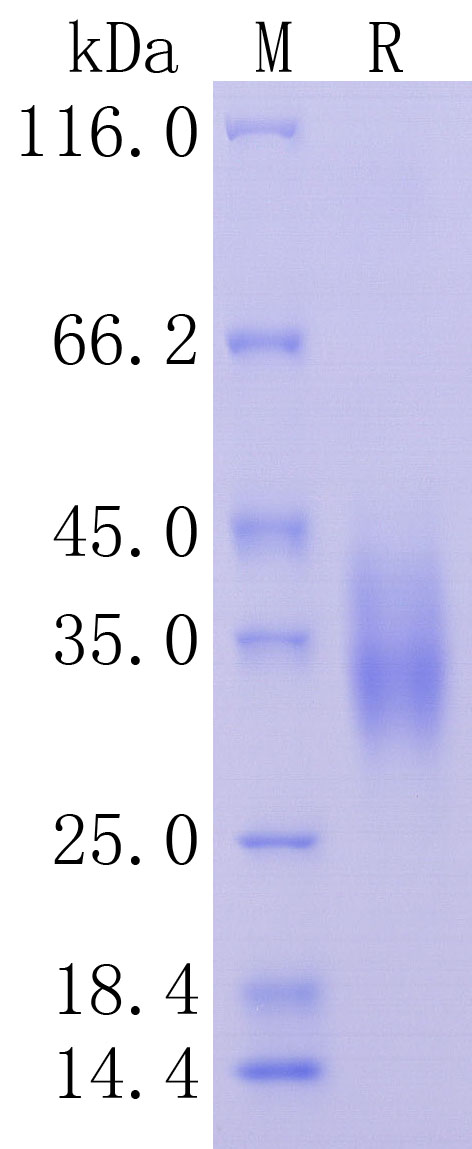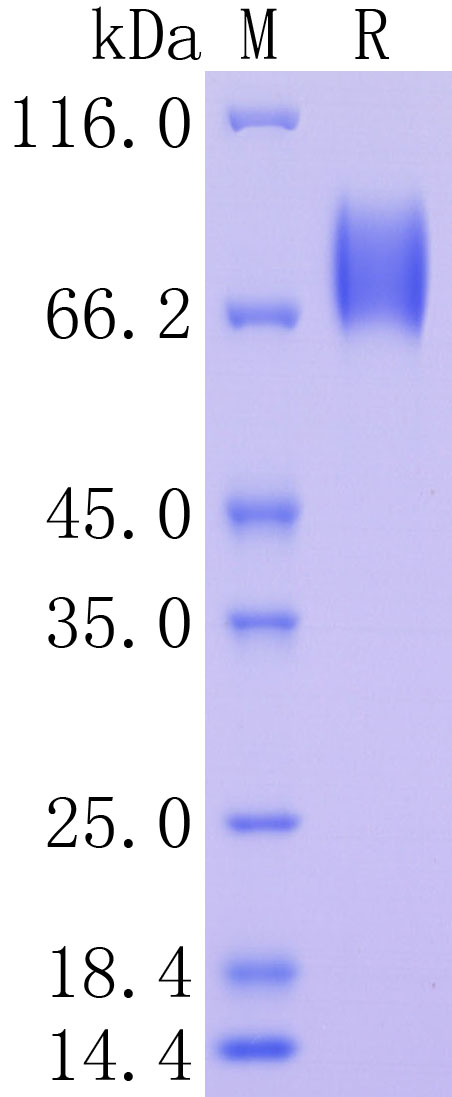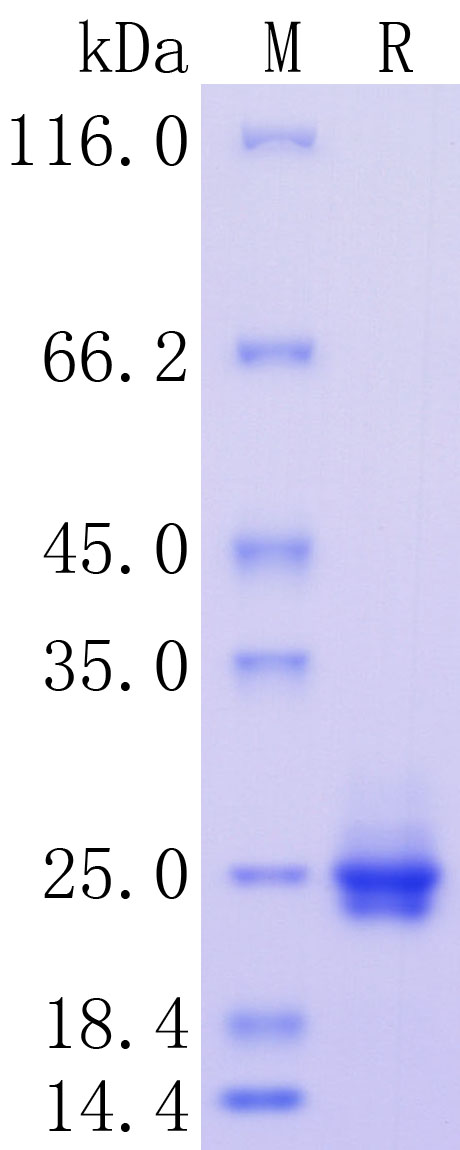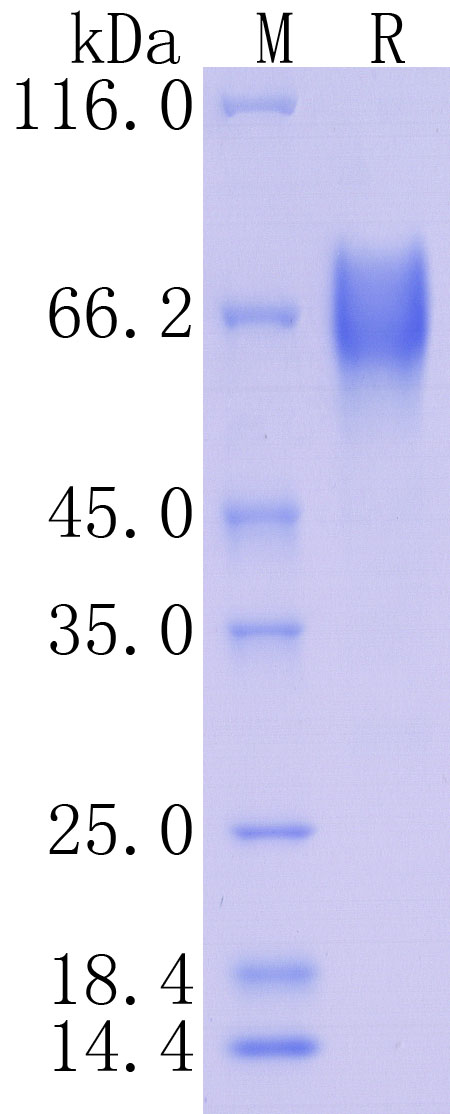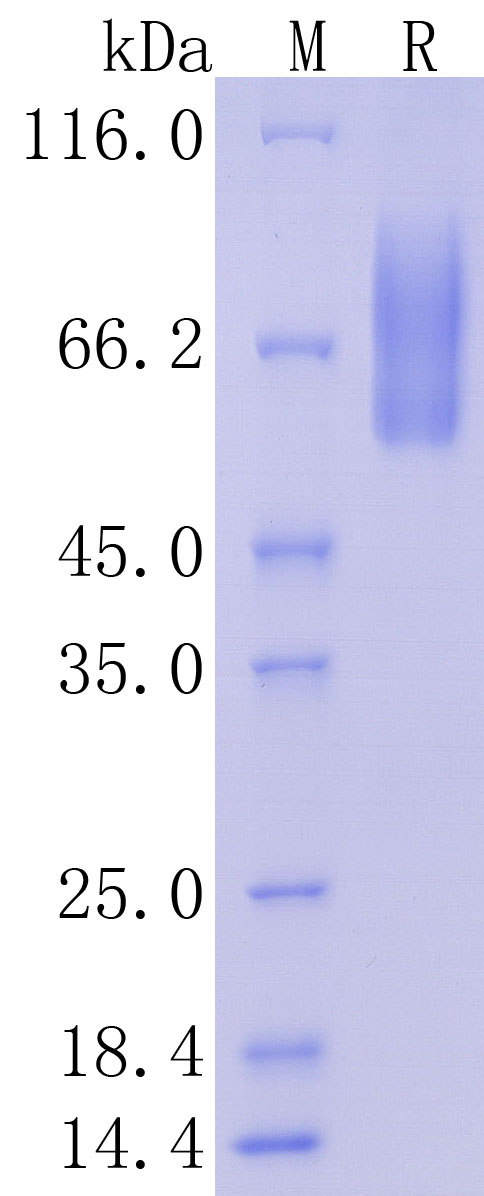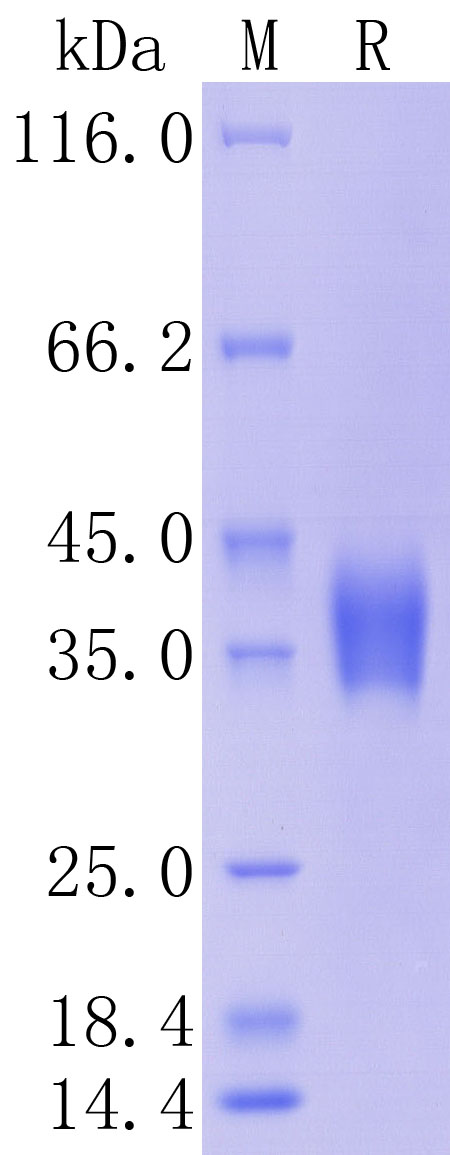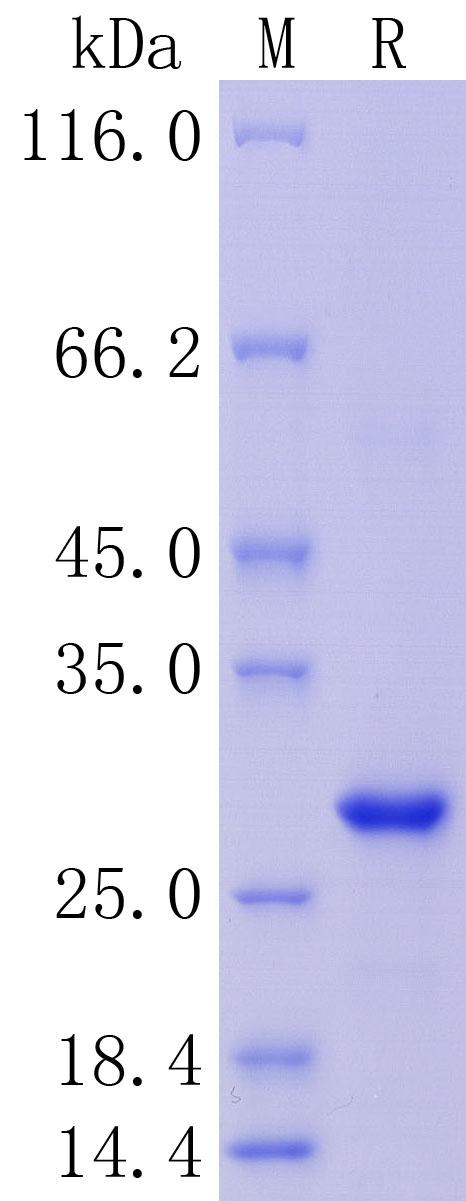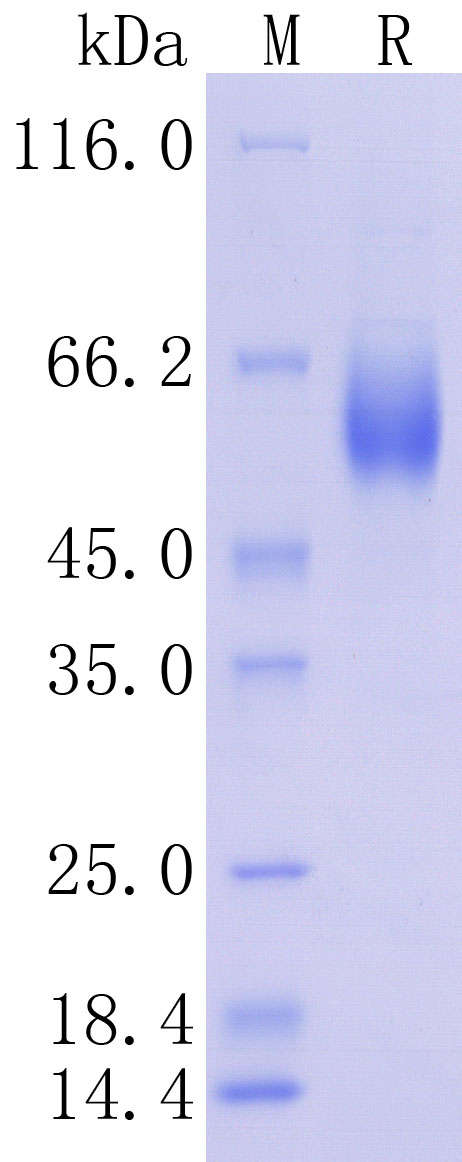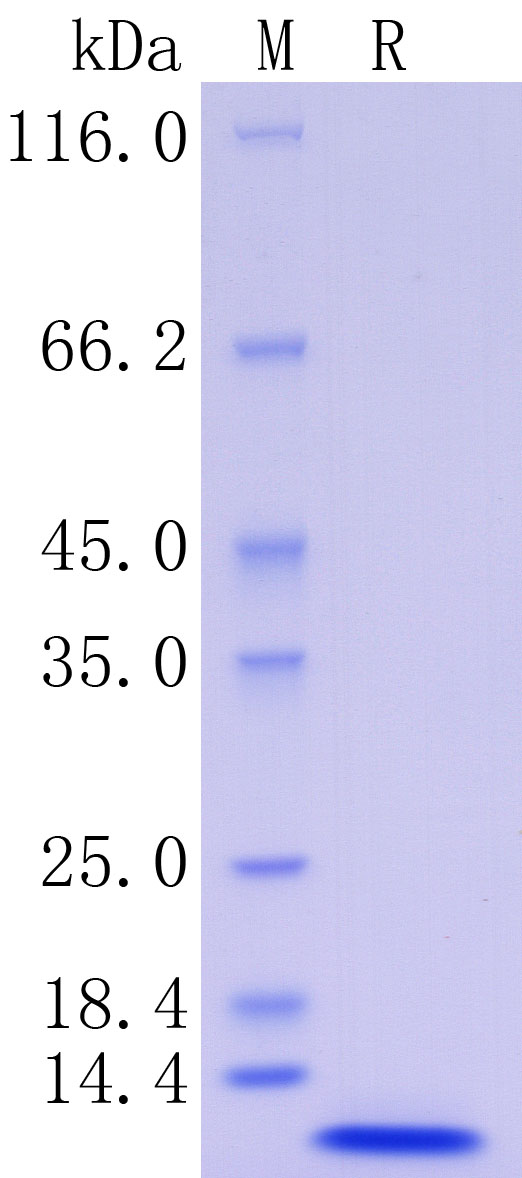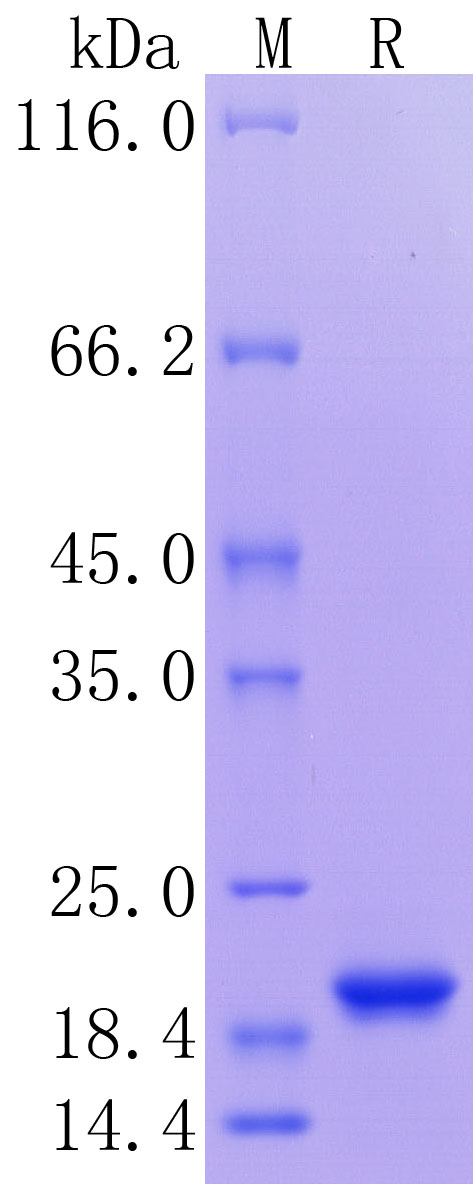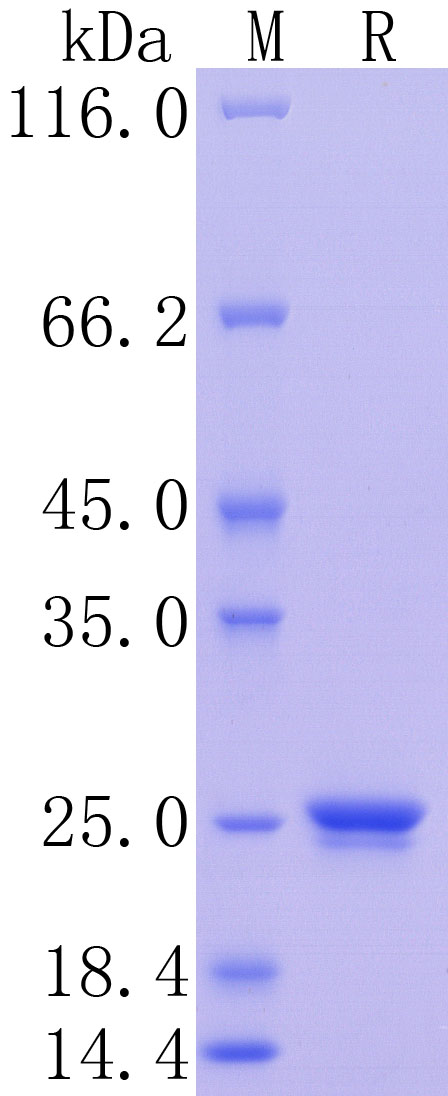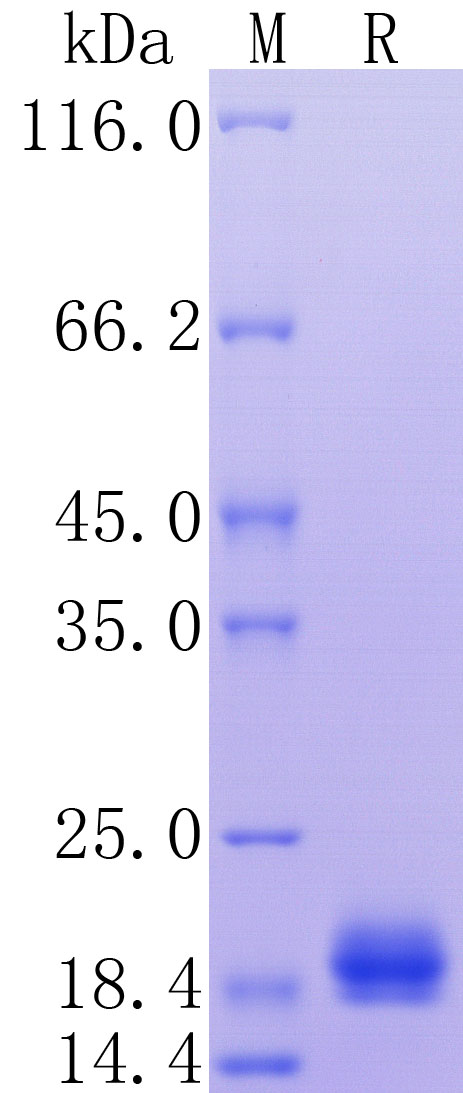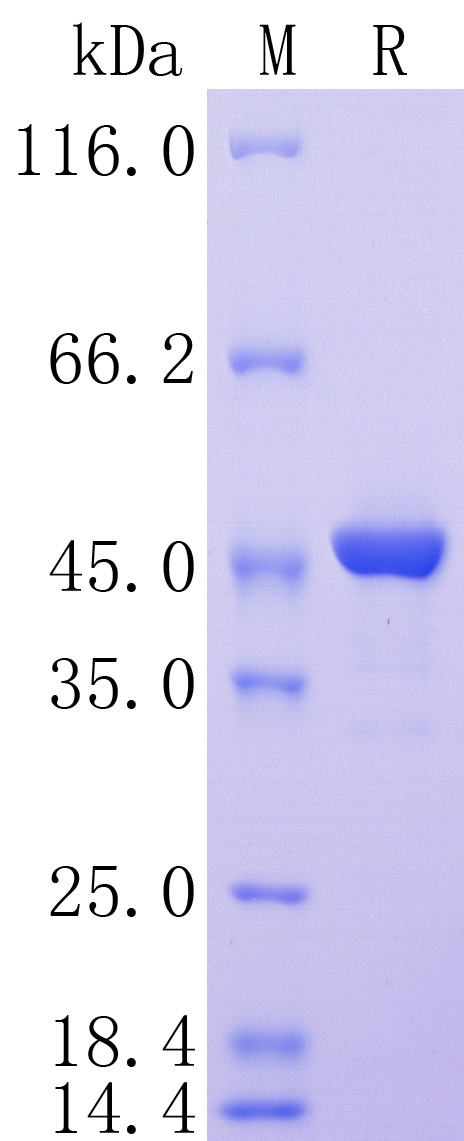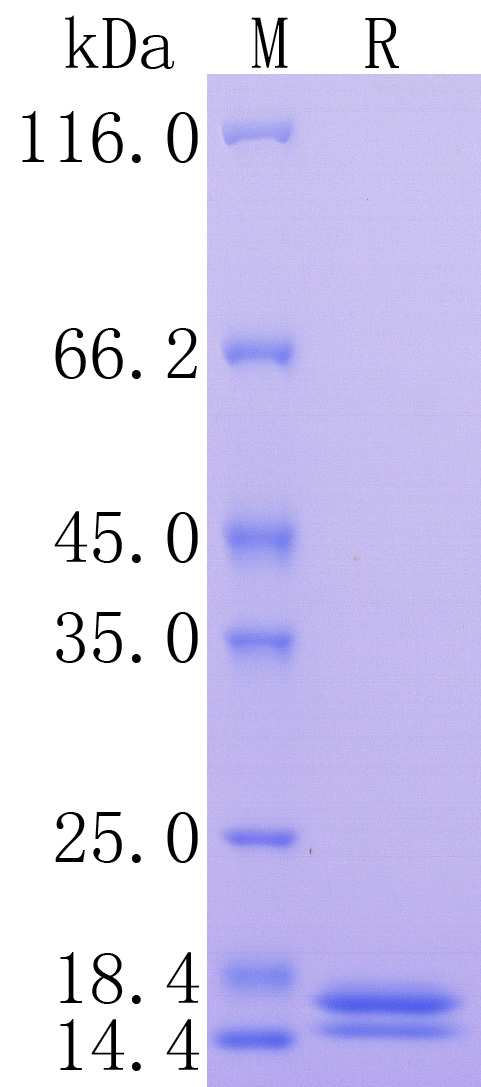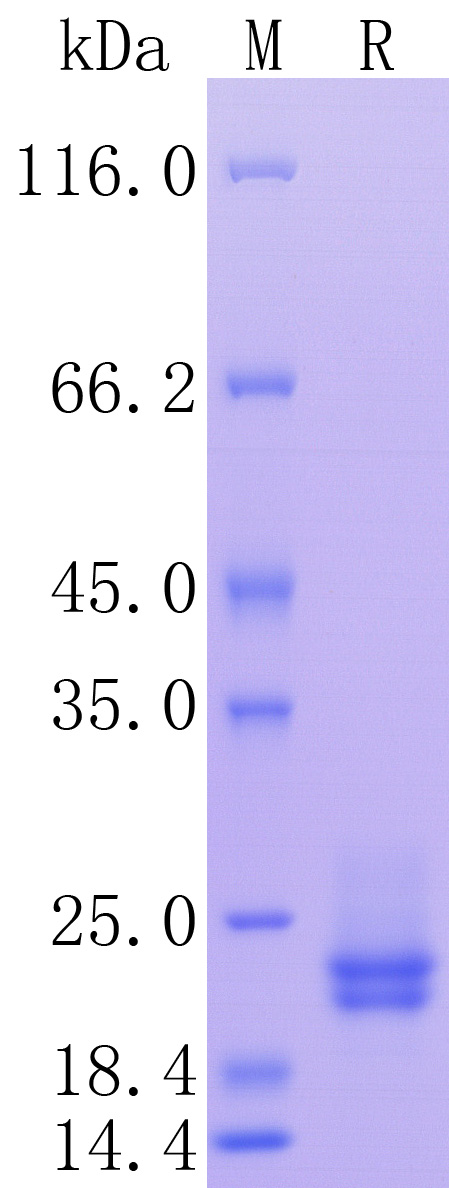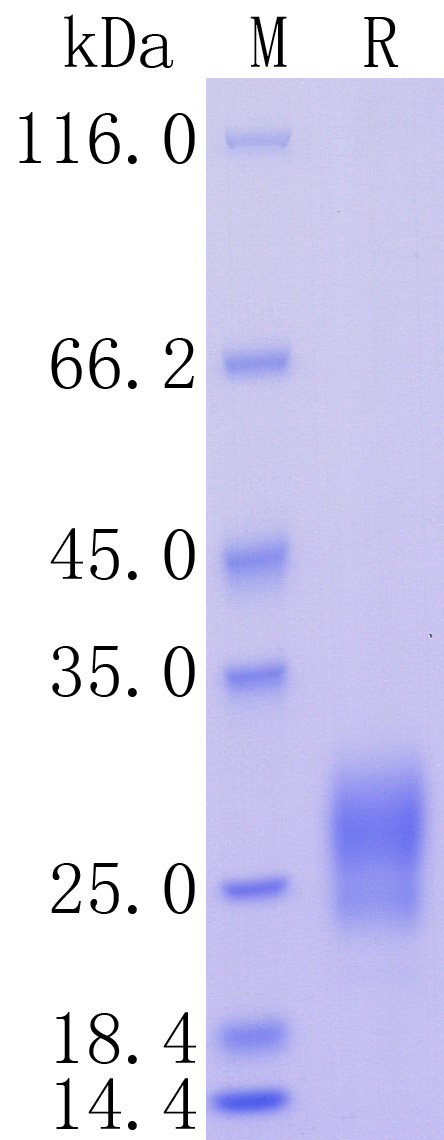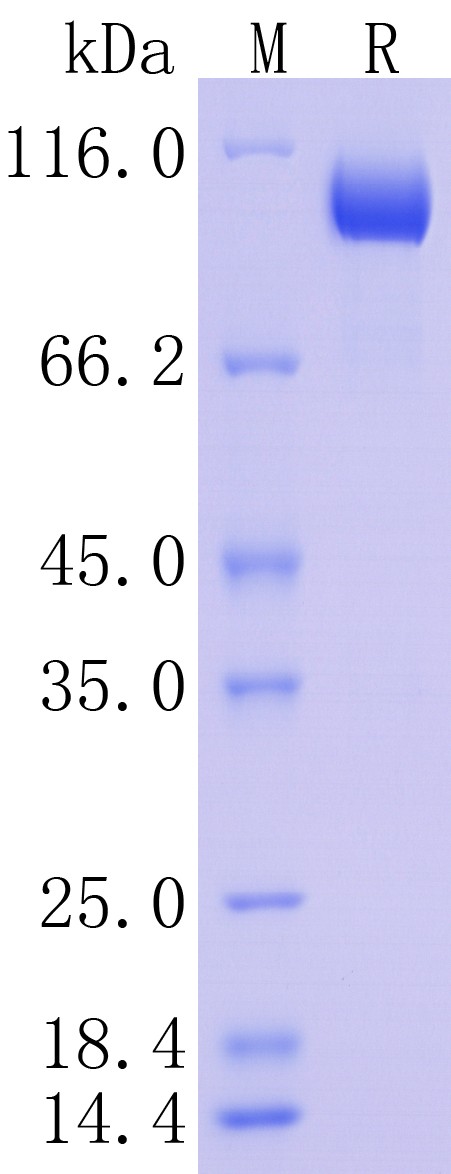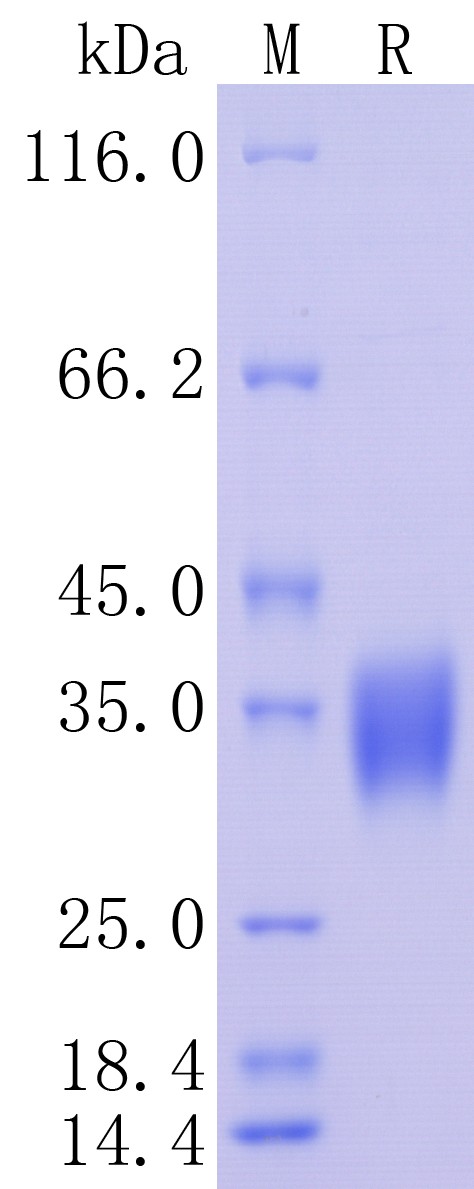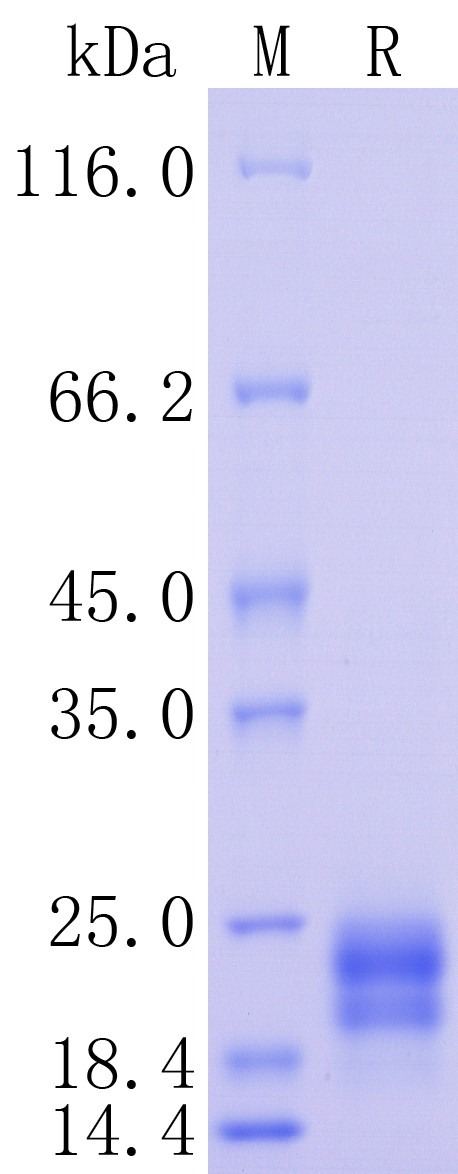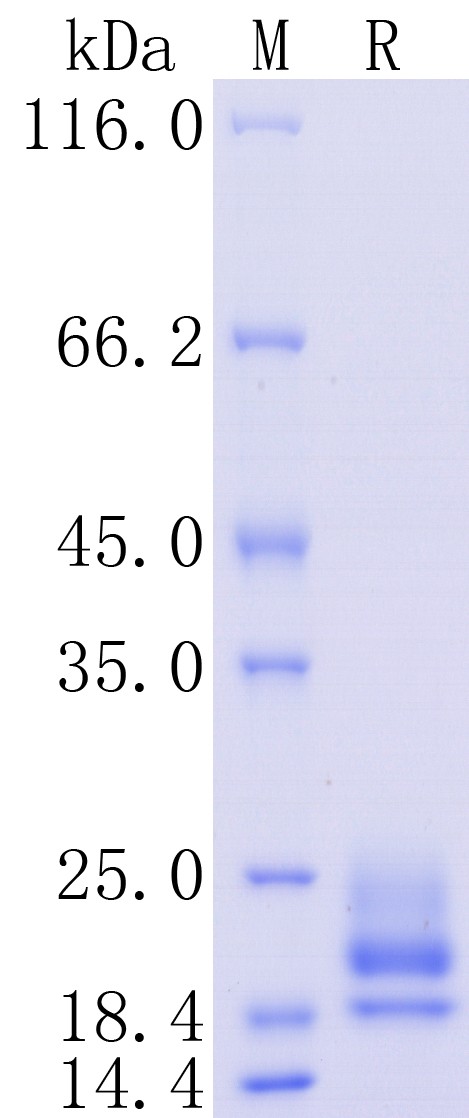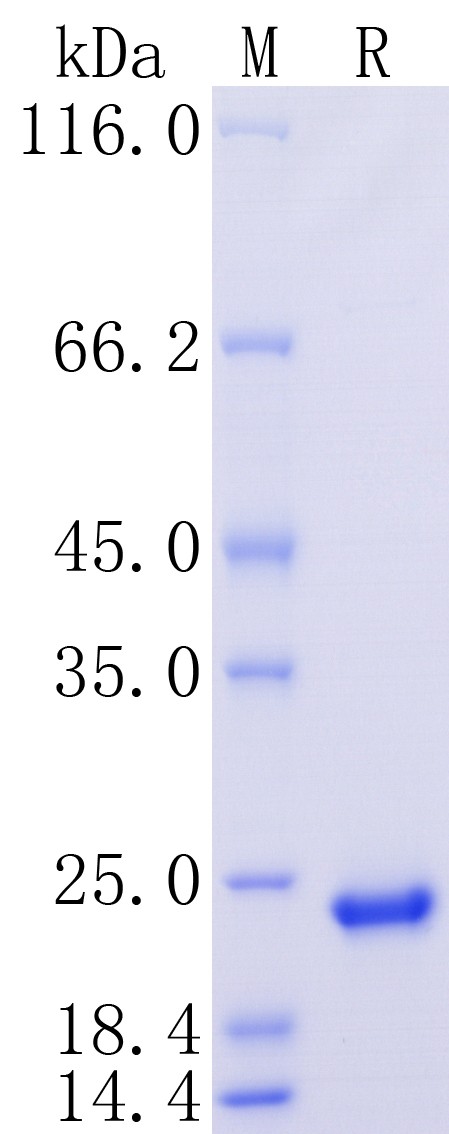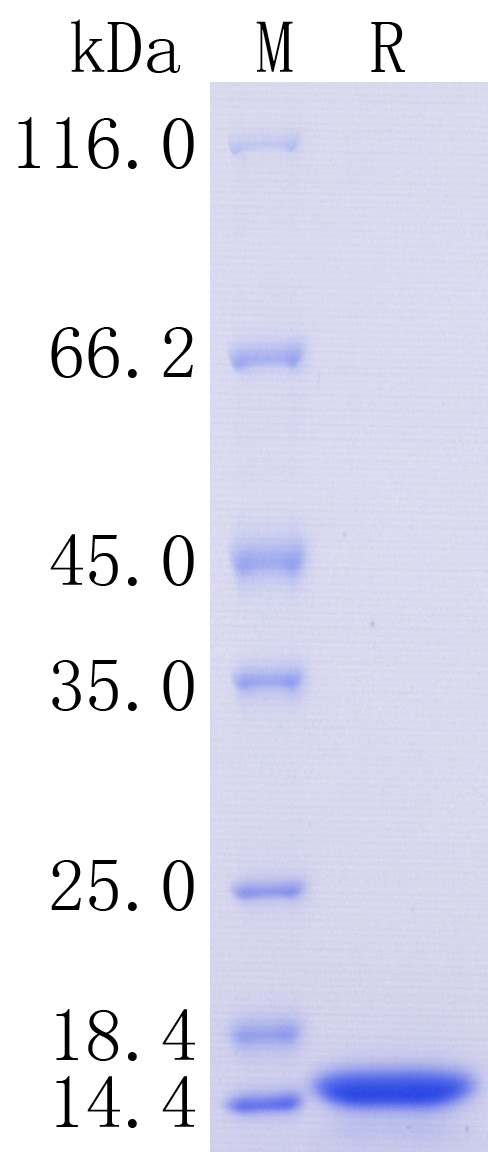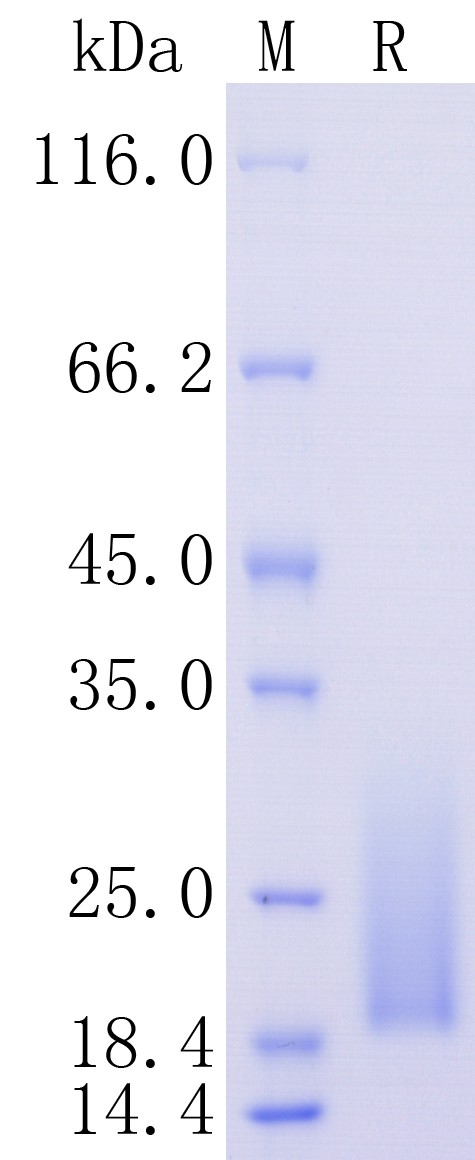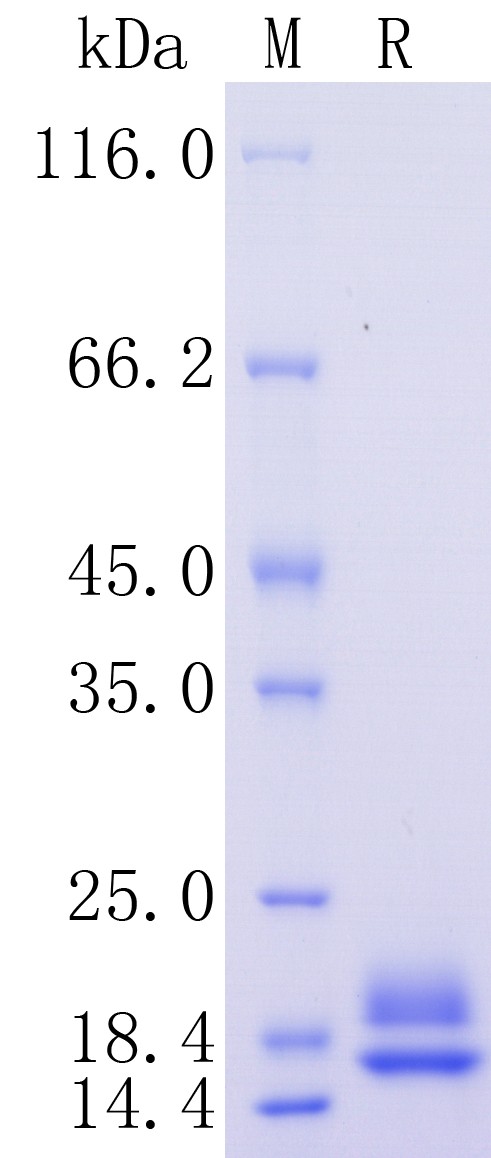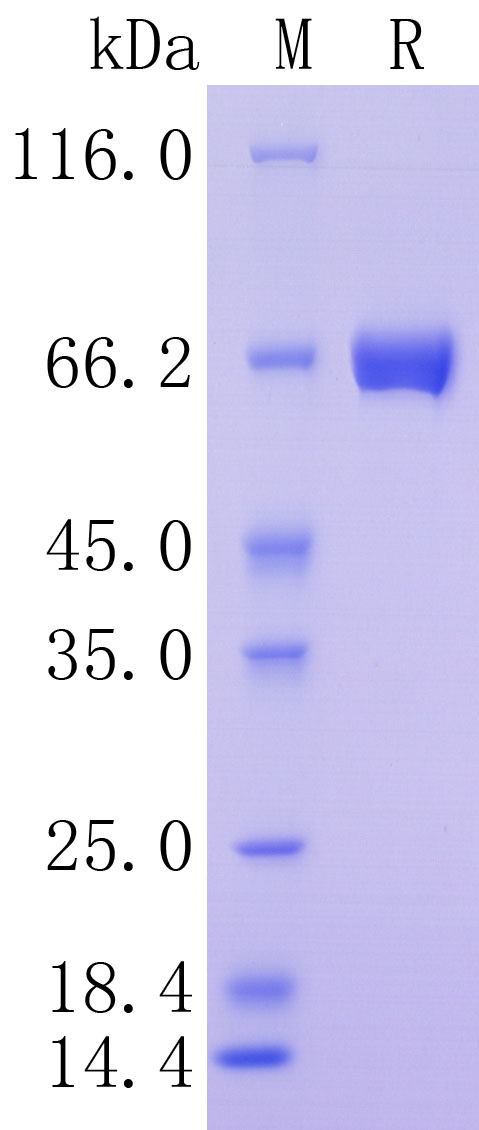Product Information
Product name
Human FGF Basic/FGF2, Tag Free
Catalog No.
HA210834
Predicted molecular mass
16.8 kD
Protein construction description
A DNA sequence encoding the human FGF Basic/FGF2 protein (P09038-4) (Pro 143-Ser 288) was expressed with tag free.
Accession
P09038-4
Protein construction
Source
E.coli
Bio Activity
Testing in progress.
Purity
>95% as determined by SDS-PAGE.
Endotoxin
Less than 1.0 EU per μg by the LAL method.
Formulation
Lyophilized from a 0.2 μm filtered solution of PBS, pH7.4, 5% Trehalose, 5% mannitol.
Species
Human
Background
The protein encoded by this gene is a member of the fibroblast growth factor (FGF) family. FGF family members bind heparin and possess broad mitogenic and angiogenic activities. This protein has been implicated in diverse biological processes, such as limb and nervous system development, wound healing, and tumor growth. The mRNA for this gene contains multiple polyadenylation sites, and is alternatively translated from non-AUG (CUG) and AUG initiation codons, resulting in five different isoforms with distinct properties. The CUG-initiated isoforms are localized in the nucleus and are responsible for the intracrine effect, whereas, the AUG-initiated form is mostly cytosolic and is responsible for the paracrine and autocrine effects of this FGF. Acts as a ligand for FGFR1, FGFR2, FGFR3 and FGFR4. Also acts as an integrin ligand which is required for FGF2 signaling. Binds to integrin ITGAV:ITGB3. Plays an important role in the regulation of cell survival, cell division, cell differentiation and cell migration. Functions as a potent mitogen in vitro. Can induce angiogenesis. Mediates phosphorylation of ERK1/2 and thereby promotes retinal lens fiber differentiation.
Usage guide
Shipping
In general, recombinant proteins are provided as lyophilized powder which are shipped with blue ice. Bulk packages of recombinant proteins are provided as frozen liquid which are shipped with dry ice.
Storage
Please avoid repeated freeze-thaw cycles. Samples are stable for up to twelve months from date of receipt at -20℃ to -80℃ It is recommended that aliquot the reconstituted solution to minimize freeze-thaw cycles.
Reconstitution
Reconstitute at 250 μg/ml in sterile water.
同靶点&同通路的产品
Human FGF7, Tag Free
Application:
Reactivity: Human
Conjugate:
Human HGF, Tag Free
Application:
Reactivity: Human
Conjugate:
Human ACE2, C-His Tag (ECD)
Application:
Reactivity: Human
Conjugate:
Human IL-2, C-His Tag
Application:
Reactivity: Human
Conjugate:
Human IL2RG/CD132, C-His Tag (ECD)
Application:
Reactivity: Human
Conjugate:
Human TRAF3, C-His Tag
Application:
Reactivity: Human
Conjugate:
Human cIAP-2/BIRC3, N-Twin Strep, C-His, Flag Tag
Application:
Reactivity: Human
Conjugate:
Human IL-8/CXCL8 Tag Free
Application:
Reactivity: Human
Conjugate:
Human Interferon alpha-2/IFNA2, C-His Tag
Application:
Reactivity: Human
Conjugate:
Human MMP-2/CLG4A, C-His, Flag Tag
Application:
Reactivity: Human
Conjugate:
Human TOPBP1, C-His Tag
Application:
Reactivity: Human
Conjugate:
Human Prolactin/PRL, C-His, Flag Tag
Application:
Reactivity: Human
Conjugate:
Human Periostin/OSF-2, C-His, Flag Tag
Application:
Reactivity: Human
Conjugate:
Human MMP-9, C-His, Flag Tag
Application:
Reactivity: Human
Conjugate:
Human IL-4R, C-His, Tag (ECD)
Application:
Reactivity: Human
Conjugate:
Human CXCL10, C-Flag Tag
Application:
Reactivity: Human
Conjugate:
Human FGF7, C-Flag Tag
Application:
Reactivity: Human
Conjugate:
Human IL-18, Tag Free
Application:
Reactivity: Human
Conjugate:
Human VEGF165, Tag Free
Application:
Reactivity: Human
Conjugate:
Human CCL2/MCP1, Tag Free
Application:
Reactivity: Human
Conjugate:
Human MMP-3, C-His, Flag Tag
Application:
Reactivity: Human
Conjugate:
Human GHRL, C-His, Flag Tag
Application:
Reactivity: Human
Conjugate:
Human CD31/PECAM-1, C-His Tag
Application:
Reactivity: Human
Conjugate:
Human TRAIL/TNFSF10, C-His Tag
Application:
Reactivity: Human
Conjugate:
Human IP-10/CXCL10, Tag Free
Application:
Reactivity: Human
Conjugate:
Human MMP-1, C-Flag
Application:
Reactivity: Human
Conjugate:
Human Mesothelin/MSLN, Tag Free
Application:
Reactivity: Human
Conjugate:
Human VE-cadherin, Tag Free (ECD)
Application:
Reactivity: Human
Conjugate:
Human IGF1, Tag Free
Application:
Reactivity: Human
Conjugate:
Human LILRB4/ILT3, C-His, Flag Tag (ECD)
Application:
Reactivity: Human
Conjugate:
Human Carbonic Anhydrase XII/CA12, Tag Free (ECD)
Application:
Reactivity: Human
Conjugate:
Human IL-17F, Tag Free
Application:
Reactivity: Human
Conjugate:
Human HGF, C-Flag Tag
Application:
Reactivity: Human
Conjugate:
Human CD63, Tag Free (ECD)
Application:
Reactivity: Human
Conjugate:
Human G-CSF, C-His Tag
Application:
Reactivity: Human
Conjugate:
Human IL-2R alpha, Tag Free
Application:
Reactivity: Human
Conjugate:
Human CALCA, C-His Tag
Application:
Reactivity: Human
Conjugate:
Human IL-2RB/CD122, C-His Tag (ECD)
Application:
Reactivity: Human
Conjugate:
Human IL-7, C-His, Flag Tag
Application:
Reactivity: Human
Conjugate:
Human FGF10, C-Flag
Application:
Reactivity: Human
Conjugate:
Human EIF4B, C-His Tag
Application:
Reactivity: Human
Conjugate:
Human Sorcin/SRI, N-Twin Strep, C-His, Flag Tag
Application:
Reactivity: Human
Conjugate:
Human ACP1, C-His Tag
Application:
Reactivity: Human
Conjugate:
Human Mesothelin, C-His Tag
Application:
Reactivity: Human
Conjugate:
Human IMMT/Mitofilin, C-His Tag
Application:
Reactivity: Human
Conjugate:
Human IL-33, C-His Tag
Application:
Reactivity: Human
Conjugate:
Human CASQ2, Tag Free
Application:
Reactivity: Human
Conjugate:
Human FGF2/b-FGF, C-His, Flag Tag
Application:
Reactivity: Human
Conjugate:
Human IL1RL1/DER4/ST2, C-hFc, His (ECD)
Application:
Reactivity: Human
Conjugate:
Human IFN-alpha/beta R2, C-His Tag (ECD)
Application:
Reactivity: Human
Conjugate:
Human SCF/KITLG, C-His Tag (ECD)
Application:
Reactivity: Human
Conjugate:
Human Osteoactivin/GPNMB, C-His Tag (ECD)
Application:
Reactivity: Human
Conjugate:
Human IFN-alpha/beta R1, C-His (ECD)
Application:
Reactivity: Human
Conjugate:
Human IL-6, C-His Tag
Application:
Reactivity: Human
Conjugate:
Human IL-6R, C-His (ECD)
Application:
Reactivity: Human
Conjugate:
Human MMP-8/CLG1, C-His, Flag Tag
Application:
Reactivity: Human
Conjugate:
Human CD30/TNFRSF8, C-His, Flag Tag (ECD)
Application:
Reactivity: Human
Conjugate:
Human EPCR/PROCR/CD201, C-His, Flag Tag (ECD)
Application:
Reactivity: Human
Conjugate:
Human CDCP1/CD318, N-Twin Strep, C-His, Flag Tag
Application:
Reactivity: Human
Conjugate:
Human IL1RL1/DER4/ST2, C-His (ECD)
Application:
Reactivity: Human
Conjugate:
Human EGF, Tag Free
Application:
Reactivity: Human
Conjugate:
Human IFNA1/IFNA13, C-Tag
Application:
Reactivity: Human
Conjugate:
Human RAC1, C-Flag Tag
Application:
Reactivity: Human
Conjugate:
Human IL-4, Tag Free
Application:
Reactivity: Human
Conjugate:
Human CKM, C-His, Flag Tag
Application:
Reactivity: Human
Conjugate:
Human IL-2, Tag Free
Application:
Reactivity: Human
Conjugate:
Human IL-6, Tag Free
Application:
Reactivity: Human
Conjugate:
Human IL-7, Tag Free
Application:
Reactivity: Human
Conjugate:
Human TIE2/TEK, C-His, Flag Tag (ECD)
Application:
Reactivity: Human
Conjugate:
Human Erythropoietin/EPO, C-His, Flag Tag
Application:
Reactivity: Human
Conjugate:
Human MMP13, C-His, Flag Tag
Application:
Reactivity: Human
Conjugate:
Human MMP-12, C-Flag Tag
Application:
Reactivity: Human
Conjugate:
Human PDGF-B, Tag Free
Application:
Reactivity: Human
Conjugate:
Human VEGF-C, C-His, Flag Tag
Application:
Reactivity: Human
Conjugate:
Human Angiopoietin-1/ANGPT1, Tag Free
Application:
Reactivity: Human
Conjugate:
Human E-Cadherin, C-His Tag (ECD)
Application:
Reactivity: Human
Conjugate:
Human M-CSF/CSF1 (33-255), C His Tag
Application:
Reactivity: Human
Conjugate:
Human M-CSF/CSF1 (33-190), Tag Free
Application:
Reactivity: Human
Conjugate:
Human FGF-21, C-His Tag
Application:
Reactivity: Human
Conjugate:
Human SAA1, C-Flag Tag
Application:
Reactivity: Human
Conjugate:
Human IL-3, Tag Free
Application:
Reactivity: Human
Conjugate:
Human VEGF121, Tag Free
Application:
Reactivity: Human
Conjugate:
Human ACP3/ACPP, C His, Flag Tag
Application:
Reactivity: Human
Conjugate:
Human A2M/alpha-2-macroglobulin, C-His Tag
Application:
Reactivity: Human
Conjugate:
